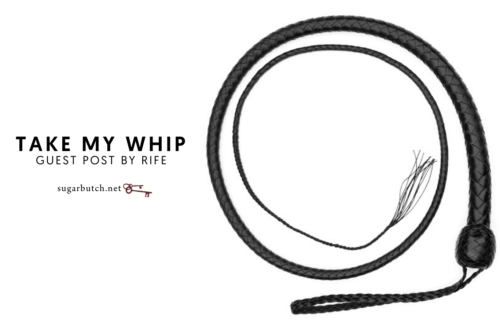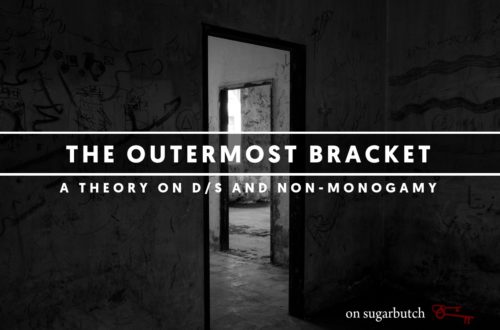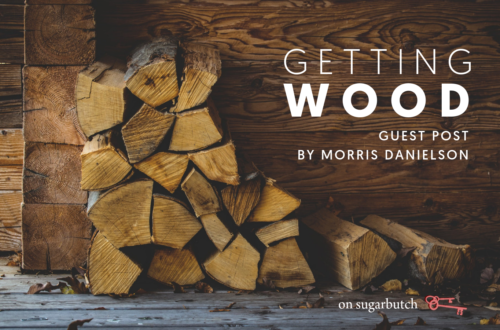This site contains explicit writings on kink practices, dominant/submissive relationships, and queer kink erotica (among other things). All characters in role play or non-consent scenes are consenting adults. Content warnings are included.
Roxy, http://uncommoncuriosity.com/
1. What insight about polyamory/open relationships would you share with your younger self?
That they exist. I was “younger” at a time (mid-80s to early-90s) when bisexuals were treated with suspicion by just about everyone (my nickname at the local LGBT Center where I volunteered was “straight girl,”) and so I wasn’t hanging out with folks who were exploring anything other than 1) dating a lot of people without commitment or 2) full monogamy. In the suburbs it’s pretty easy to go your whole life just drinking the kool-aid and never knowing there is anything else out there.
Now that my eyes have been opened, I continue to be amazed at all the different ways folks “do” poly. Sometimes it’s easy for me to get stuck in an idea that there’s a wrong way and a right way, and I have to keep reminding myself to keep an open mind along with the open relationship.
2. What has been the hardest thing about navigating multiple relationships, and how have you overcome that?
Given that I drank gallons of the kool-aid, it’s been hard to reframe what relationships can be if you’re not following the Princess Bride, one true love, model. Despite all of the wonderful work that’s been written about poly, there still aren’t a lot of role models who are successful and happy in popular culture, either in real life (astonished and scandalized reactions to Tilda Swinton come to mind as one of the few) or fiction. Living in a socially progressive, but still pretty relationship-conservative, area means that I spend a lot of time either trying to explain all of poly in one sentence (“It’s like telling your partner they can cheat, right?” “Oh, I could never do that. I get jealous.”) or just not speaking up and feeling very isolated. It helps to have a strong virtual community of friends who are navigating some of the same issues and challenges.
A lot of other interviewees have mentioned communication, which is very, very key, but also one of the hardest parts for me. I’m constantly amazed that other people know themselves well enough to express it in anything other than questions – I find myself stumbling through sometimes, just trying to work out what’s right for me and what’s not. Frequently something will seem like a great idea in my head and then turn out to be an absolute disaster in practice.
Another issue is that I *am* a romantic, and that can be very scary, because there’s a lot of pressure in the scene to be easy-going and laissez-faire like the cool kids. It’s so dangerously easy to give in to internal pressure to be ok with a lot that I’m not really ok with, afraid of being labeled – *gasp* – clingy or needy, or being rejected altogether. Thankfully, I’ve been involved with two wonderful partners who love me for the person I am, not the person I sometimes wish I were, and I’m learning to ask for what I need, no matter how intimidating it feels. From personal experience, I can attest to the fact that it’s much less messy to admit to having needs up front rather than simply falling apart into a mess when you manage to break your own heart.
Putting that into practice remains an ongoing project for me.
Oh, and jealousy? *Sigh* Still working on it.
3. What has been the best thing about being open/poly?
At its best, it’s like you’re in love with the whole world. You feel supported and loved and beautifully fulfilled. For me, NRE lasts as long as the relationship, and I love being in love, and I adore people. Each partner offers precious new surprises and new ways to look at the Universe, and so there’s just that much more to be amazed by.
At its worst, it offers you a real-time education in patience with yourself and everyone around you.
Each extreme has been a gift.
Poly is a crucible that burns away extraneous distractions and demands your presence, attention, and full participation. I’ve learned to use words like “space” and “support” without snickering. I’ve learned to consider and express feelings, and that alone is a miracle. Despite an excellent education in the sciences, I managed to avoid maturing emotionally beyond about 14 years old, and it went unchallenged for decades. The past 4 to 5 years have offered me the (sometimes unwelcome) opportunity to develop skills I never had before, and I am very grateful for that opportunity, despite my occasionally quite pitiful thrashing at the time.
Stepping outside the box affords a view of the world that can be daunting, but liberating, and full of possibility. Having to sit down to negotiate parts of life many take for granted gives you the chance to create something new and wonderful. The price can be high, but the rewards are beyond what I would have imagined.
4. Anything else you’d like to add?
I am *so* thankful to everyone who contributed to this series. The relationships I’m involved in have been changing recently, and I’ve been struggling with where my future might lie. Reading about all the myriad choices and flavors that others have chosen is opening my mind to new possibilities for myself, and I feel a lifeline of connection to everyone else who’s exploring this brave, new world.



